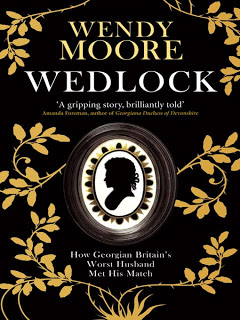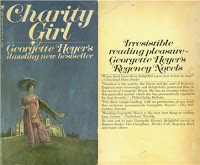
A rare burst of non-fiction.
This book tells the story of Mary Eleanor Bowes, a woman of the seventeenth century, who was the wealthiest heiress in England, and possibly in Europe. At one point a certain Capt Stoney defends her honour in a duel, and she is assured by multiple medical men that he is about to die. His dying wish is to marry her, and in a burst of romance, she does so. Hours after the ceremony, he miraculously recovers.
He then starts to spend her money with a vengence. He does other things with a vengence too, such as beat her up. As is common in domestic violence situations, it gets worse and worse. Eventually, she’s not allowed to move from one room to another without someone escorting her. She’s not allowed out, even to her beloved greenhouses in her own garden. She was a noted naturalist, and funded one of the first botanical expiditions to the Cape. (She was in fact responsible with this trip for proving the existence of giraffes to Europeans – previously these had been thought to be mythic. She donated the carcass to John Hunter, of the Hunterian museum here in London. He cut off it’s legs and left it in his entryway to boggle his guests’ minds).
Stoney was intent on convincing people that he was the long-suffering and caring husband of a strange and eccentric wife, so he’d give her instructions, before dinner parties, for example that she could only say ‘yes’ or ‘no’, no matter what was said to her, or had to remain totally silent and so on. So people thought she was crazy. He also didn’t let her get any new clothes, so she was virtually in rags, and barely let her eat. Meanwhile he spent her money with gay abandon. The phrase ‘stoney broke’ actually comes from him. When his younger sister came to live with them (though her parents tried to dissuade her, as even they knew he was crazy), he controlled her too, not letting her out at all. She eventually escaped after three years and fled back to her parents in Ireland.
Eventually it got so bad Mary genuinely thought she was going to die. Peviously, all the maids had been handpicked by him, and most were his mistresses, either willingly or unwillingly (ie, he was also a rapist). On this occasion however he’d let someone else choose a maid, and that person, Mary Morgan, was well educated and tough. Usually he chose very ill educated poor people. So anyway, this lady clocks what is going on, and she and two other maids organise for Mary to escape. So they leave the house too, without any pay, and hide her in their slum homes. She then finds a lawyer, willing to fight her case on a no-win no-fee basis.
She stays in hiding while her case proceeds, but eventually Stoney manages to abduct her – in broad daylight, on a busy London street. This is too much even for the very sexist legal structures of the day, and they are swiftly pursued. As he runs, dragging her around the country, the poor woman is so determined to die rather than have anything further to do with him, that she manages to stand up to him. At one point he says he will shoot her if she doesn’t sign a renunciation of her legal claims, and she basically says “Shoot and be damned” – which he does, but luckily for her it’s a misfire.
So eventually they are found, and she gets her divorce – one of the first in England – laying down an important precedent, that while it was okay to beat your wife(!) it wasn’t okay to beat her to a pulp. In jail, let me tell you, this Stoney guy gets some twenty year old girl interested, and KEEPS HER LOCKED UP IN A CELL WITHIN A CELL for twenty years. Very Austrian basement. No one sees her, she has five kids. Now this I think merited a novel in itself, but I guess there’s less research material to base a book on with a very poor, illiterate woman than with this Mary. Even Mary’s school books survive, and small things – such as, for example – the note she managed to scribble while she was being abducted. (Naturally Stoney tried to claim she wanted to be abducted, later, at the trial, so this was important evidence)
100 points to Wendy Moore for keeping the story really gripping. I was up till 2am. It was also a good reminder of what people have suffered to get women to where they are today. So all those girls today who who go out with the intention of being bought drinks all night, or who aspire to be Page 3 girls, or whatever. BE ASHAMED.


